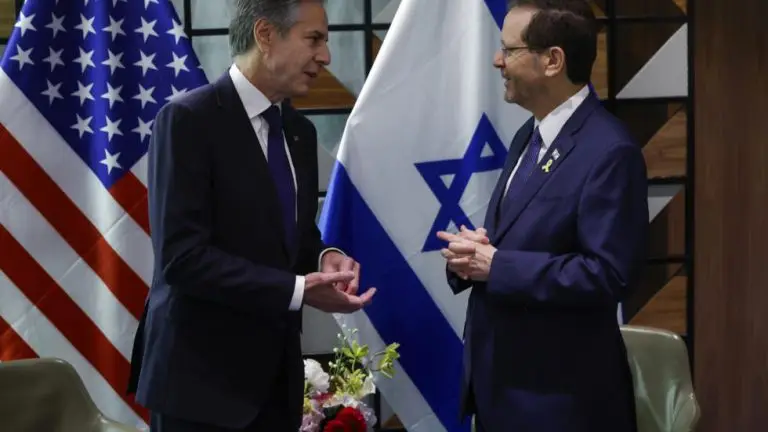1st May, 2024
Top US diplomat, Antony Blinken, has urged Hamas to accept a truce in the Gaza Strip on Wednesday, after Israeli Prime Minister, Benjamin Netanyahu, vowed to send troops into its far southern city of Rafah.
Washington has heightened pressure on all sides to reach a ceasefire — a message pushed by Blinken, who was on his seventh regional tour since the Gaza war broke out in October.
“Even in these very difficult times we are determined to get a ceasefire that brings the hostages home — and to get it now,” Blinken said as he met Israeli President, Isaac Herzog in Tel Aviv.
“And the only reason that that wouldn’t be achieved is because of Hamas”, he said.
Herzog’s role is largely ceremonial, but later Blinken was due to meet the hawkish Netanyhu to press US calls for a truce, more aid into Gaza and better protection for civilians.
Hours before Blinken landed in Tel Aviv late Tuesday, the right-wing premier fired a shot across his bows, vowing to send Israeli ground troops into Rafah despite US concern for the safety of the 1.5 million civilians sheltering in Gaza’s far southern city.
“We will enter Rafah and we will eliminate the Hamas battalions there with or without a deal,” he told families of some of the hostages still being held in Gaza, his office said.
Netanyahu’s comments came as Hamas was weighing the latest plan for a truce proposed in Cairo talks with US, Egyptian and Qatari mediators.
The Palestinian militant group said it was considering a plan for a 40-day ceasefire and the exchange of scores of hostages for larger numbers of Palestinian prisoners.
Hamas, whose envoys returned from Cairo talks to their base in Qatar, would “discuss the ideas and the proposal”, said a Hamas source, adding that “we are keen to respond as quickly as possible”.
Al-Qahera News, a site linked to Egyptian intelligence services, earlier reported that Hamas negotiators were due to “return with a written response”.
An Israeli official told AFP the government “will wait for answers until Wednesday night”, and then “make a decision” whether to send envoys to Cairo.
New aid route
On the previous leg of his regional tour in Jordan, Blinken said a Gaza truce and the redoubling of aid deliveries went hand in hand.
A truce is “the most effective way to relieve the suffering” of civilians in Gaza, he told reporters near Amman.
Blinken saw off a first Jordanian truck convoy of aid heading to Gaza through the Erez crossing reopened by Israel.
“It is real and important progress, but more still needs to be done,” he said.
UN agencies have warned that without urgent intervention, famine looms in Gaza, particularly in northern areas which are hardest to reach.
A US-built floating pier on Gaza’s coast is expected to be completed later this week, said Cyprus, the departure point for the planned “maritime corridor”.
Blinken said the pier would “significantly increase the assistance” but was not “a substitute” for greater overland access.
In northern Gaza’s Beit Lahia, across from Erez crossing, 24-year-old farmer Yussef Abu Rabih was replanting plots he said had been “completely destroyed” by the fighting.
“We decided to return to farming despite difficult conditions and scarce resources” after suffering “severe hunger”, he told AFP.
‘Unbearable escalation’
The war started after Hamas’s October 7 attack on southern Israel resulted in the deaths of 1,170 people, mostly civilians, according to an AFP tally of Israeli official figures.
Israel’s retaliatory offensive has killed at least 34,535 people in Gaza, mostly women and children, according to the health ministry in the Hamas-run territory.
Palestinian militants also took some 250 hostages on October 7. Israel estimates 129 remain in Gaza, including 34 believed to be dead.
Washington has strongly backed its ally Israel but also pressured it to refrain from a ground invasion of Rafah, which is packed with displaced civilians.
Calev Ben-Dor, a former analyst for the Israeli foreign ministry and now deputy editor for specialised review Fathom, told AFP that Netanyahu’s “Rafah comments likely have more to do with trying to keep his coalition intact, rather than operational plans in the near term”.
The prime minister “is feeling the squeeze between the Biden administration” and far-right members of his government who have vehemently opposed the proposed truce, Ben-Dor said.
Analyst Mairav Zonszein, of the International Crisis Group, said Netanyahu “sounds like someone who is not interested in a deal”.
UN chief Antonio Guterres said an Israeli assault on Rafah would “be an unbearable escalation, killing thousands more civilians and forcing hundreds of thousands to flee”.
At the British parliament, Deputy Foreign Secretary Andrew Mitchell said the government was “doing everything (it) can” to prevent the offensive.
The war and its toll on Palestinian civilians have sparked international outrage, but also political momentum in the search for a post-war solution to the wider Israeli-Palestinian conflict.
European and Arab foreign ministers met in the Saudi capital on Monday to discuss how to join forces on advancing a two-state solution.
To provide Israel with an incentive, Washington has pushed the prospect of normalised relations with Gulf kingpin Saudi Arabia.
Riyadh has demanded “irreversible” steps towards Palestinian statehood, which Netanyahu and many members of his hard-right government oppose.
AFP






